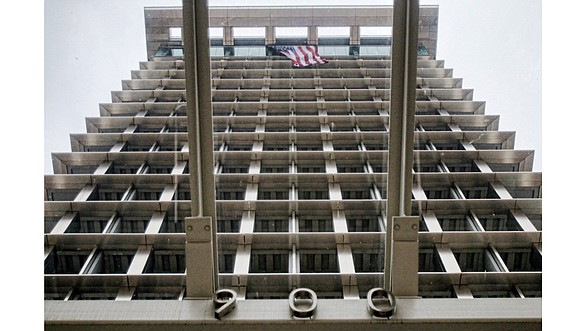Finally — City Council ready to vote on new budget May 15
Jeremy M. Lazarus | 5/9/2017, 8:46 a.m.
Veteran Richmond police officers and firefighters are in line for major raises after July 1 in a bid to slow their departure to surrounding localities that pay more.
The pay hike for the frontline public safety employees is among the key highlights of Richmond City Council’s version of the 2017-18 budget that the nine council members wrapped up this week and plan to vote on at a special meeting Monday, May 15.
The city’s 3,000-plus other employees will not get fatter paychecks.
Although Mayor Levar M. Stoney’s budget plan remains largely intact, the council’s version includes a host of amendments.
For example, the council shifted $450,000 to enable the police to replace leaky and outdated horse stables with a new facility. They also found $100,000 to enable Richmond Police Chief Alfred Durham to pay overtime to at least 12 officers to patrol the six major public housing communities in a bid to reduce a spike in shootings and homicides.
Meanwhile, extra money also will be steered to the city Department of Parks, Recreation and Community Facilities to hire employees to run two recreation centers, one in North Side and the other in South Side, that the city has invested several million dollars to renovate, but which the mayor declined to staff.
City Council also cleared the Department of Public Works to purchase eight new trucks and hire 15 people to ramp up its collection of appliances, tree branches and other bulk items people leave in alleys and on curbs, but found a way to cut the mayor’s proposed $2.50 monthly fee for bulk collection to 80 cents.
The city’s library system also will get additional dollars to fill vacant positions and have Sunday hours at most branches.
As part of its decision-making, the council supported the mayor’s proposal to eliminate the annual free leaf collection program, leaving home and apartment owners with two options: To bag their leaves and leave the bags by their Supercans for pickup at no charge or to pay a fee of at least $30 and call for a truck to come and vacuum leaf piles.
The nine council members spent more than 35 hours wrestling with changes, including an 18-hour marathon session Monday and additional six hours Wednesday to finalize the spending plan.
Police and firefighter pay improvements represented the council’s top priority.
Veteran Councilwoman Ellen F. Robertson, 6th District, exemplified the council’s frustration with the mayor’s budget plan when she expressed disappointment that Mayor Stoney left the governing body with the task of finding an additional $2.7 million to fully fund raises for police and firefighters.
“This was something the administration as well as the council endorsed, so why didn’t he include sufficient funds in his budget?” she told the Free Press.
While Mayor Stoney boasted in his budget message and in later public statements that he had addressed the issue, his budget plan included only half the funding needed for the raises.
Amid a spike in crime, the pressure on council was heightened as Chief Durham embarked on a whirlwind lobbying campaign to push for the additional dollars.
The chief kept telling the public and the council that he was losing veterans and had no chance of reaching the department’s authorized strength of 750 sworn officers — even adding new recruits — and bringing crime under control unless the pay issue was addressed.
In a rebuke to the mayor in the scramble to shift dollars, the council took $500,000 that Mayor Stoney had proposed to use to subsidize operation of the renovated train shed at Main Street Station that is soon to open.
At one point, council also suggested taking $430,000 that the mayor earmarked to hire six more caseworkers for the Center for Workforce Innovation — a key element of the city’s anti-poverty fight — to boost the number of people getting help to find jobs despite criminal records.
The issue of finding money appeared to be resolved when the city finally issued the long delayed audit of its 2016 fiscal year that ended last June 30 and showed a $13 million surplus.
However, the mayor stuck the money in the city’s “rainy day” savings account and used his authority to block the council from tapping part of the savings. That frustrated council members who could not come up with the $2.7 million to fund a 2.5 percent cost-of-living increase for other city employees or to pay for priority needs in their districts.
The mayor did release a bit more revenue, certifying that rising real estate values would generate an extra $2.2 million in taxes above projections for the 2018 fiscal year — easing some of the pressure on the council.
In addition, council members Kim Gray, 2nd District, and Kristen Larson, 4th District, used their knowledge of the Richmond Public Schools budget to free up another $1 million.
In the wake of the revelation that the school system had amassed $8.3 million in savings, that led council to allocate $6.3 million of that money after the mayor agreed to certify it was available.
The lion’s share was earmarked to pay off the remaining $4.2 million the school system borrowed for a lease-purchase of school buses. The school system had planned to continue spending $1 million a year to pay off the lease over four years. Council’s decision to use the school system’s savings to pay off the lease released $1 million for the council to use for other purposes.
Council also dictated that the school system spend $1.3 million for technology and required much of the remainder go toward school maintenance.
On other fronts, the council protected the $1.6 million increase the mayor proposed for GRTC’s public transit service and approved funding to enable the city assessor to retain three employees that the mayor did not fund.







